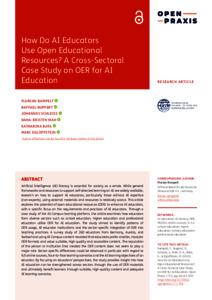|
How do AI educators use open educational resources? A cross-sectoral case study on OER for AI education
Rampelt, Florian
;
Ruppert, Raffael
;
Schleiss, Johannes
;
Mah, Dana-Kristin
;
Bata, Katharina
;
Egloffstein, Marc
![[img]](https://madoc.bib.uni-mannheim.de/69749/1.hassmallThumbnailVersion/67fe59016244f.pdf)  Vorschau |
|
PDF
67fe59016244f.pdf
- Veröffentlichte Version
Download (1MB)
|
|
DOI:
|
https://doi.org/10.55982/openpraxis.17.1.766
|
|
URL:
|
https://openpraxis.org/articles/10.55982/openpraxi...
|
|
URN:
|
urn:nbn:de:bsz:180-madoc-697491
|
|
Dokumenttyp:
|
Zeitschriftenartikel
|
|
Erscheinungsjahr:
|
2025
|
|
Titel einer Zeitschrift oder einer Reihe:
|
Open Praxis
|
|
Band/Volume:
|
17
|
|
Heft/Issue:
|
1
|
|
Seitenbereich:
|
46-63
|
|
Ort der Veröffentlichung:
|
Preston
|
|
Verlag:
|
Cammor
|
|
ISSN:
|
1369-9997 , 2304-070X
|
|
Sprache der Veröffentlichung:
|
Englisch
|
|
Einrichtung:
|
Fakultät für Betriebswirtschaftslehre > Wirtschaftspädagogik, Technologiebasiertes Instruktionsdesign (Ifenthaler 2015-)
|
|
Bereits vorhandene Lizenz:
|
 Creative Commons Namensnennung 4.0 International (CC BY 4.0) Creative Commons Namensnennung 4.0 International (CC BY 4.0)
|
|
Fachgebiet:
|
004 Informatik
370 Erziehung, Schul- und Bildungswesen
|
|
Freie Schlagwörter (Englisch):
|
AI education , AI literacy , OER , MOOCs , online courses , K–12 , school education , higher education , tertiary education , professional education
|
|
Abstract:
|
Artificial Intelligence (AI) literacy is essential for society as a whole. While general frameworks and resources to support self-directed learning on AI are widely available, research on how to support AI educators, particularly those without AI expertise (non-experts), using external materials and resources is relatively scarce. This article explores the potential of open educational resources (OER) to enhance AI education, with a specific focus on the requirements and practices of AI educators. Through a case study of the AI Campus learning platform, the article examines how educators from diverse sectors such as school education, higher education and professional education utilise OER for AI education. The study aimed to identify patterns of OER usage, AI educator motivations and the sector-specific integration of OER into teaching practices. A survey study of 260 educators from Germany, Austria, and Switzerland using AI Campus content revealed that educators prefer smaller, modular OER formats and value suitable, high-quality and accessible content. The reputation of the person or institution that created the OER content does not seem to play a major role. Sector-specific differences could be observed in particular with regard to full online courses, face-to-face learning scenarios and the AI learning objectives of an educator. By focusing on educators’ perspectives, the study provides insight into how AI education can be strengthened across sectors through the use of OER materials and ultimately benefit learners through suitable, high-quality content and adequate AI learning scenarios.
|
 | Dieser Eintrag ist Teil der Universitätsbibliographie. |
 | Das Dokument wird vom Publikationsserver der Universitätsbibliothek Mannheim bereitgestellt. |
 Suche Autoren in Suche Autoren in
BASE:
Rampelt, Florian
;
Ruppert, Raffael
;
Schleiss, Johannes
;
Mah, Dana-Kristin
;
Bata, Katharina
;
Egloffstein, Marc
Google Scholar:
Rampelt, Florian
;
Ruppert, Raffael
;
Schleiss, Johannes
;
Mah, Dana-Kristin
;
Bata, Katharina
;
Egloffstein, Marc
ORCID:
Rampelt, Florian ; Ruppert, Raffael ; Schleiss, Johannes ; Mah, Dana-Kristin ; Bata, Katharina ; Egloffstein, Marc  ORCID: 0000-0002-2377-7889 ORCID: 0000-0002-2377-7889
Sie haben einen Fehler gefunden? Teilen Sie uns Ihren Korrekturwunsch bitte hier mit: E-Mail
Actions (login required)
 |
Eintrag anzeigen |
|
 ORCID: 0000-0002-2377-7889
ORCID: 0000-0002-2377-7889



 Creative Commons Namensnennung 4.0 International (CC BY 4.0)
Creative Commons Namensnennung 4.0 International (CC BY 4.0) Suche Autoren in
Suche Autoren in